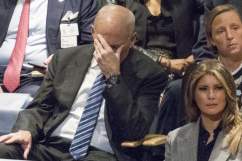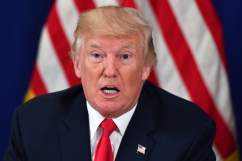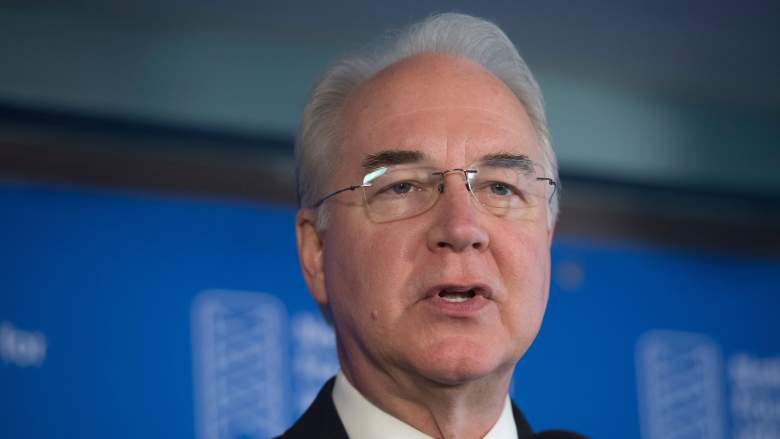
Getty US Secretary of Health and Human Services Tom Price attends a press conference about influenza prevention for the upcoming flu season at the National Press Club in Washington, DC, September 28.
Amid intense scrutiny for his use of private planes, Tom Price announced his resignation as the head of the U.S. Department of Health and Human Services on Friday.
Price thanked President Donald Trump in his resignation letter, and added that he regretted that “recent events have created a distraction” from important objectives.
A White House statement said Trump would designate Don J. Wright as the acting secretary until a new one is nominated and confirmed by the Senate. Wright currently serves as the deputy assistant secretary for Health and is the director of the Office of Disease Prevention and Health Promotion.
Price’s resignation comes days after he came under fire when it was reported he spent over $1 million in taxpayer dollars on dozens of chartered private flights since May. On Thursday, POLITICO reported that Price used military aircraft on trips to Africa and Europe, which came at a price tag of over $500,000 to taxpayers. According to the article, Price’s wife, Betty, accompanied him on many of the flights while other members of his department flew commercially.
On Thursday, Price vowed to reimburse the cost of his seat on domestic flights using private aircraft, reportedly an amount around $52,000. Health and Human Services spokeswoman Charmain Yoest said Price has since reimbursed the agency for his wife’s travel but didn’t offer specifics.
Earlier on Friday, Trump told reporters he’d make an official decision of Price’s future in the evening. He called Price a “fine man,” but said he “didn’t like the optics.”
Upon receiving the news, Trump expressed that he wasn’t pleased and was going to “look into it.”
“I will tell you personally, I’m not happy about it,” he told reporters earlier in the week. “I am not happy about it I’m going to look at it. I let him know it.”
Price’s resignation will almost certainly set off a rigorous process in Senate to find and confirm a new replacement. Here are a few people that have been speculated as possible replacements to serve as the head of the department:
Dr. Scott Gottlieb
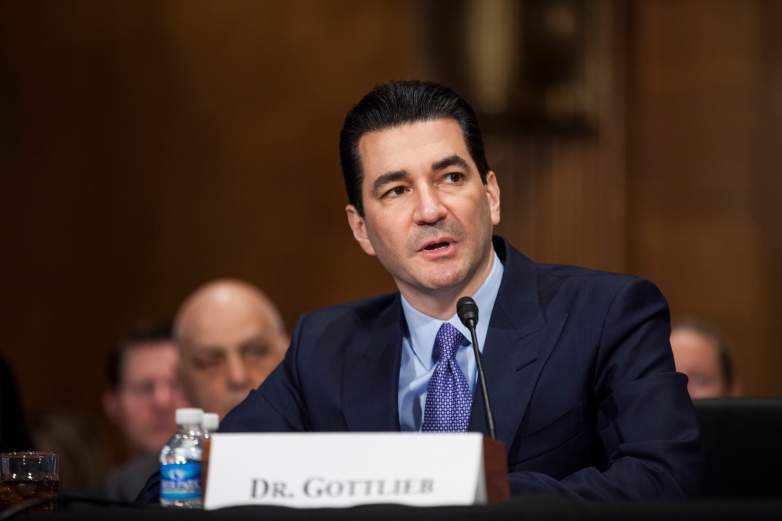
GettyFDA Commissioner-designate Scott Gottlieb testifies during a Senate Health, Education, Labor and Pensions Committee hearing on April 5 at on Capitol Hill in Washington, D.C.
Gottlieb is the current commissioner of the Food & Drug Administration after he was confirmed to the role by the Senate in May. Prior to that, he worked in different capacities for the federal government, including serving as the deputy commissioner of Medical and Scientific Affairs at the Food and Drug Administration.
In 2013, Gottlieb was appointed by Senate Minority Leader Mitch McConnell as a member of the Federal Health IT Policy committee, which works with the Department of Health and Human Services in making recommendations on the meaningful use standards.
After Trump was elected in November, Gottlieb served as an advisor on his transition team. Before that, he was an advisor on the presidential campaign of Wisconsin Gov. Scott Walker.
Seema Verma
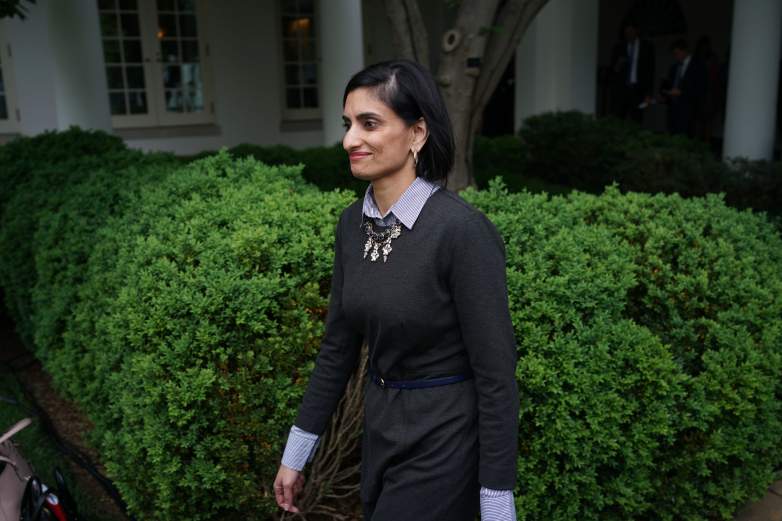
Administrator of the Centers for Medicare and Medicaid Services Seema Verma arrives in the Rose Garden of the White House to attend a press conference following the House of Representative vote on the health care bill on May 4 in Washington, DC.
Verma is the current administrator of the Centers for Medicare and Medicaid Services. She gained her reputation through her health consulting firm, SVC Inc. She’s the founder, president and CEO of the firm she created in 2001. The company worked with insurance agencies in different states in preparation for the implementation of the Affordable Care Act.
Verma was nominated by Trump to serve as the administrator of the Centers for Medicare and Medicaid Services on November 29, 2016. The department is responsible for overseeing the Obamacare insurance markets in addition to Medicare and Medicaid. She was confirmed by the Senate on March 13 by a 55-43 vote.
At her confirmation hearing, she avoided answering a question about whether she’d be in favor of a national extension of Medicaid provisions, the same ones she helped secure in Indiana. According to The Washington Post, Indiana now requires everyone who receives benefits to pay monthly premiums. In turn, their contributions would be invested into a health savings account. The provision received criticism especially because poor people who are unable to make the monthly payments are bumped down to a lower-tier of coverage while those with above-average income are temporarily removed from the program.
On her first day in office, Verma sent a letter with Price to the nation’s governors encouraging them to impose insurance premiums for Medicaid, start charging Medicaid recipients for emergency room visits and advise recipients of the care to get jobs or job training.
Former Gov. Bobby Jindal
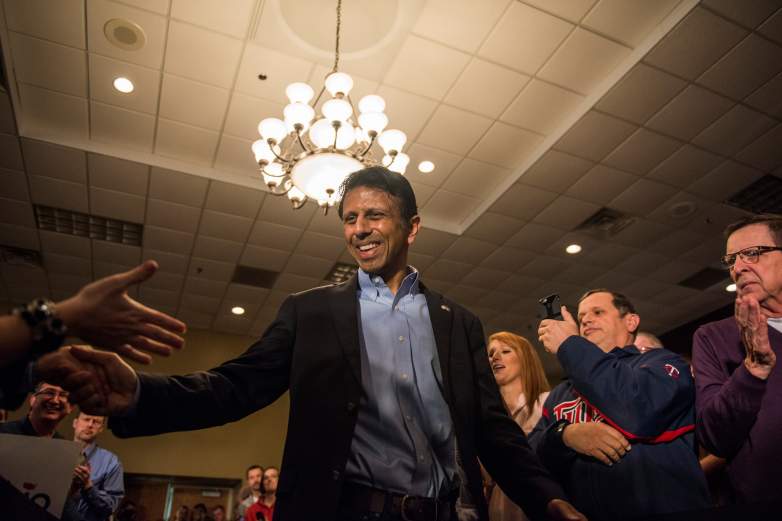
Gov. Bobby Jindal (R-LA) introduces Republican presidential candidate Sen. Marco Rubio (R-Fla.) to a crowd of supporters Courtyards of Andover Event Center in Andover, MN. Rubio is hoping to win Minnesota in the Super Tuesday primary election.
Jindal served as the governor of Louisiana from 2008-2016 after he was a congressman. His career experience in the healthcare industry started in 1996 when he was appointed as the secretary of the Louisiana Department of Health and Hospitals. Two years later, he became the youngest president in the history of the University of Louisiana at 28-years old.
When George W. Bush was elected in 2000, he appointed Jindal to serve as an advisor to the U.S. Secretary of Health and Human Services. After a failed gubernatorial campaign in 2003, he was elected to serve in the U.S. House of Representatives in 2004 and decided to run for governor once again in 2007. Jindal won the election and became the second-youngest person to serve as the state’s governor.
Jindal announced his intention to run for president in 2015 and launched his campaign for the 2016 nomination. While on the campaign trail, Jindal once called Trump a “narcissist” and an “egomaniacal madman.”
His campaign didn’t last long, as he suspended it in November 2015 and endorsed Sen. Marco Rubio. After Trump was named the Republican nominee, Jindal said he’d support Trump “because electing Donald Trump would be the second-worst thing we could do this November, better only than electing Hillary Clinton to serve as the third term for the Obama administration’s radical policies.”

